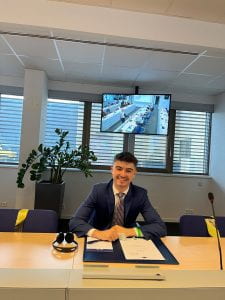

Hi everyone!
I’m writing to you from Brussels, the de-facto capital of Europe, where my group and I are on our first overnight academic trip. Yesterday afternoon, my cohort and I arrived in the city, and will be spending three days in Belgium before heading to Paris for the second part of the trip.
Today, our group had the opportunity to meet officials from the European Commission. The Commission is the executive branch of the EU, which also bears the power to propose legislation- it is an extremely important part of EU governance, and, arguably, the most powerful branch in the organization. Clad in suits and other business attire, our group travelled to the EU district of Brussels early this morning, to an EC conference building. From there, we went through an intense security check, and were guided to a conference room that is used by commissioners for debate and discussion.
I have never felt more like a public official in my life. The room itself was ampitheater style, with long tables. My seat, along with all the others, had a notepad, pen, microphone, and headphones (used for translation) Moreover, the room was surrounded by a series of monitors which displayed footage from cameras which were recording the conference room. Each time someone turned on their microphone and started talking, the camera would pan over to them and film them speaking- so everyone in the room could see them easily.
Moreover, it was very interesting to hear the two EC employees speak. One was a policy specialist who concentrated in EU asylum policy and law. The other employee was essentially a diplomat, working in an EU partnership with Eastern European countries outside of the EU. These countries include Belarus, Azerbaijan, Georgia, Armenia, and, most notably Ukraine. After hearing presentations on EU-Eastern relations and the changes in Refugee policy following the 2015 Syrian diaspora, we had the opportunity to ask questions. Of course, most of us had questions regarding the EU and Ukraine, especially for the diplomat. In particular, I asked the diplomat a question about whether he believes a standing army will be established for the EU. This was an idea floated by French President Emmanuel Macron, and has gained much traction, especially following the invasion of Ukraine. The representative responded that he does believe the standing military is a very real possibility for the EU. He said it would be a “very big deal”, likely reconfigure the purpose and conceptualization of the EU, making it far closer to a state than a supranational institution. In other words, the Ukraine crisis could be the final step to turning Europe into a country, rather than a union of sovereign nations. It will take time to see whether the military idea comes to volition, and how monumental such an act would be. However, I feel very fortunate to be studying and immersing myself in the EU when radical change in the political order seems to be on the horizon.
My trip to the European Commission is something that I feel extremely privileged to have done, something I will never forget. Stay tuned for more Updates!
-Andrew